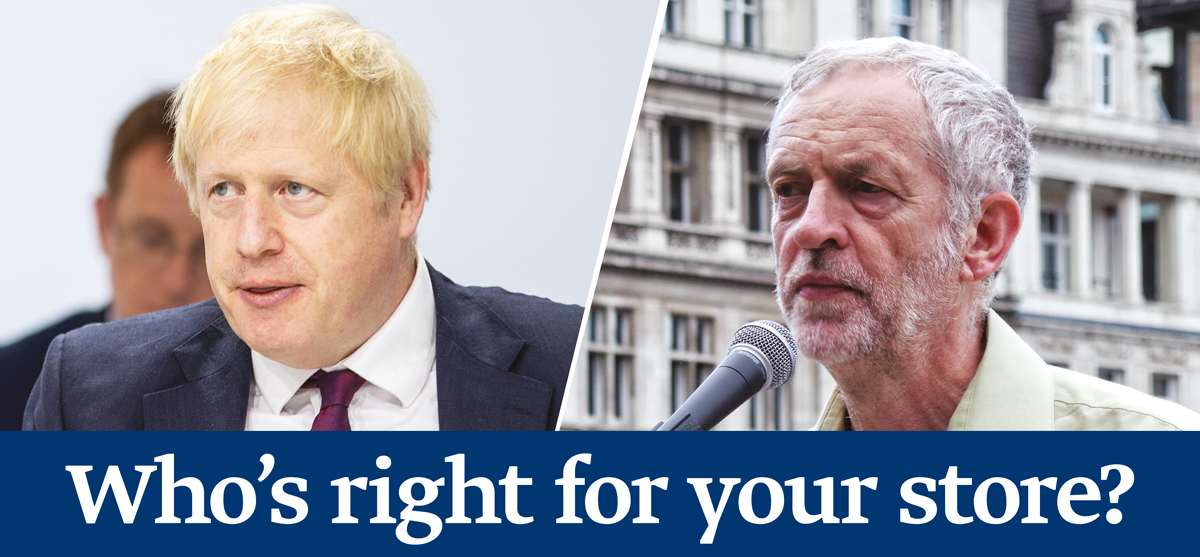Conservatives
Boris Johnson pledged to put 20,000 more police officers on the streets and the manifesto pledges to introduce tougher sentencing.
However, he also claimed improvements to rehabilitation were needed to prevent reoffending and announced plans to create a prisoner education service and invest £500m in youth services.
If elected, the party would pass a victims’ law giving shop owners and other victims of crime additional rights.
The Conservatives promised not to raise the rates of income tax, national insurance, corporation tax or VAT, with the intention of protecting incomes.
The party will raise the employment allowance and the National Insurance threshold to £9,500, representing a saving for many of the UK’s 405,000 convenience store staff.
Stores that do not comply with worker’s rights would face a new single enforcement body that would crack down on issues such as refusing staff sick pay.
Stores could also see an impact on rota scheduling, with workers being given the right to request more ‘predictable’ hours.
Local and regional newspapers would receive an extension of their business rates exemptions.
Last week, Better Retailing reported the party’s intention to give a fundamental review of the business rates system, with the first step being a reduction for small retailers, followed by the review.
The party promised to “review alcohol duty to ensure our tax system is supporting British drink producers”, while “a crackdown on illicit tobacco packaging” would target counterfeit products.
Labour
Jeremy Corbyn pledged to re-establish neighbourhood policing and recruit 2,000 more frontline officers than the Conservatives. Labour said it would reform police funding to ensure local needs are met.
The party has promised no further increase on VAT, but will increase corporation tax. Those on incomes above £80,000 will pay more income tax.
Both major parties committed to a minimum wage above £10 per hour, but Labour will make it available to all adult workers. It promised to “use savings to public finances to help small business manage the extra cost”.
The party detailed new worker rights for store owners, including banning zero-hour contracts, ending probationary periods and protection against unfair dismissal.
Labour said business rates were causing “real harm” for retailers and promised to “review the option of a land value tax”.
Post office retailers would see an end to ‘crown’ post offices being sold off, and Royal Mail would be nationalised, reuniting it with the publicly owned Post Office.
A government owned ‘Post Bank’, run through post offices, and a ban on ATM charges would protect access to cash and banking services.
Labour pledged to extend the Soft Drinks Industry Levy to milk-based drinks and introduce ‘junk food’ advertising restrictions.
Labour said it would “review the evidence on minimum pricing”, suggesting a UK-wide minimum alcohol price level could be introduced.
Other parties
The Green party has pledged to abolish council tax and business rates altogether, replacing them with a land value tax.
If elected, the party will increase employment allowance to £10,000 per year, allowing small businesses to hire more people, increase wages or reduce prices.
The Brexit party has said it will address wage stagnation and restrict immigration, and would abolish business rates for shops outside of London.
Liberal Democrats promised to replace business rates and to introduce minimum unit pricing for the UK. It will also restrict marketing of unhealthy food and drink in stores, but only in “multiple retailers”. The SNP is yet to launch its manifesto.
Read more: Conservatives and Labour outline first policies to affect independent retailers



Comments
This article doesn't have any comments yet, be the first!